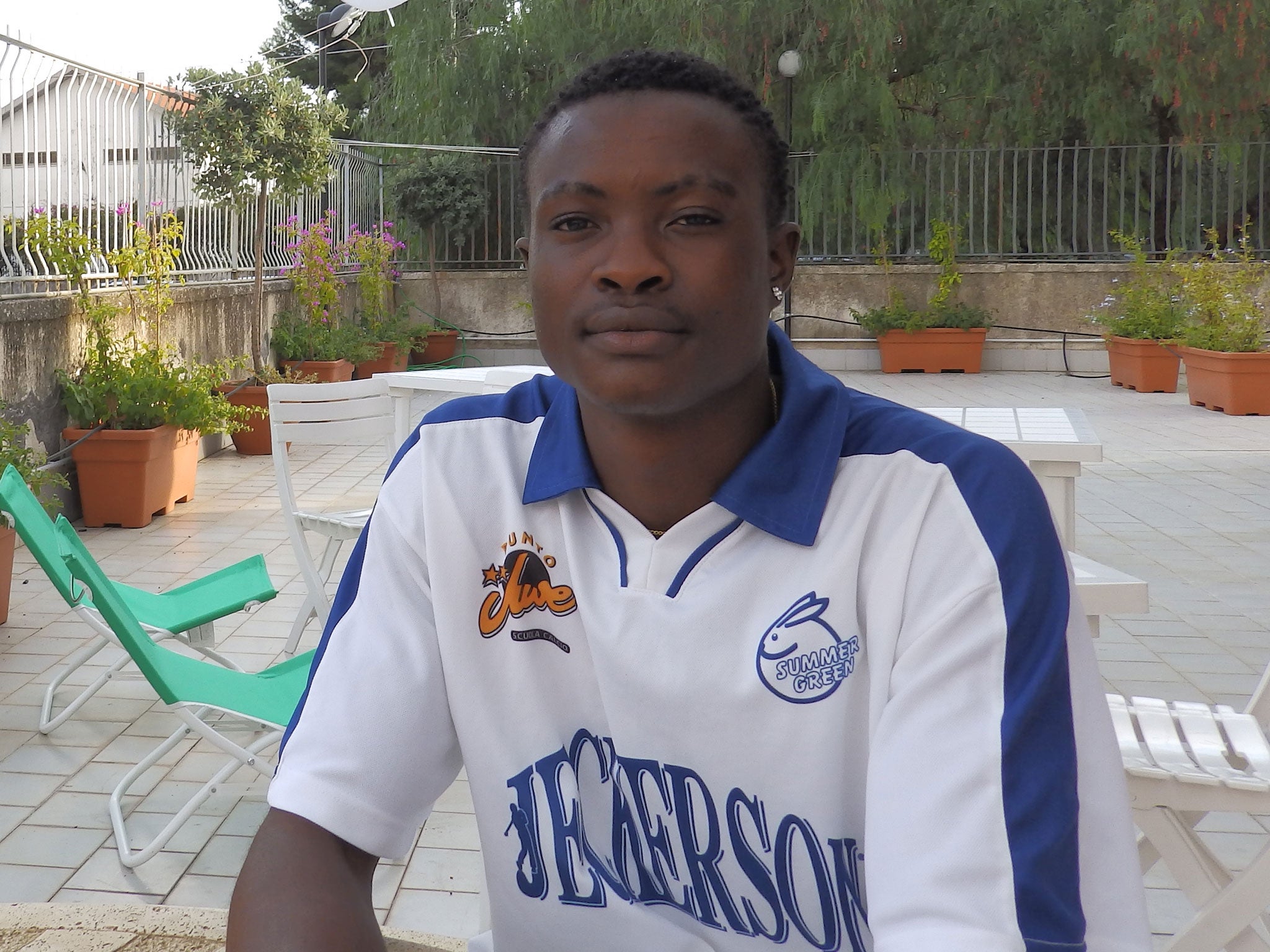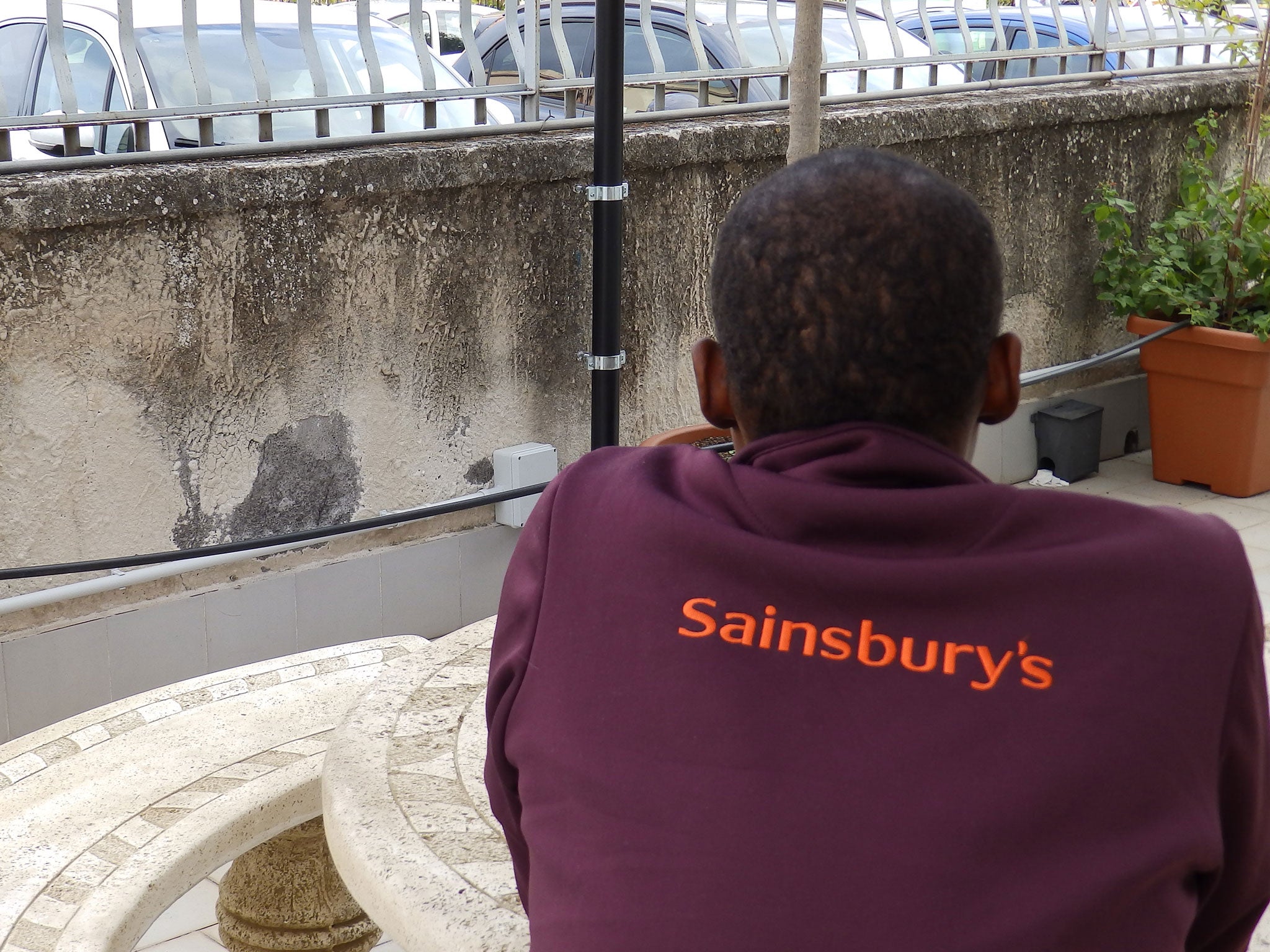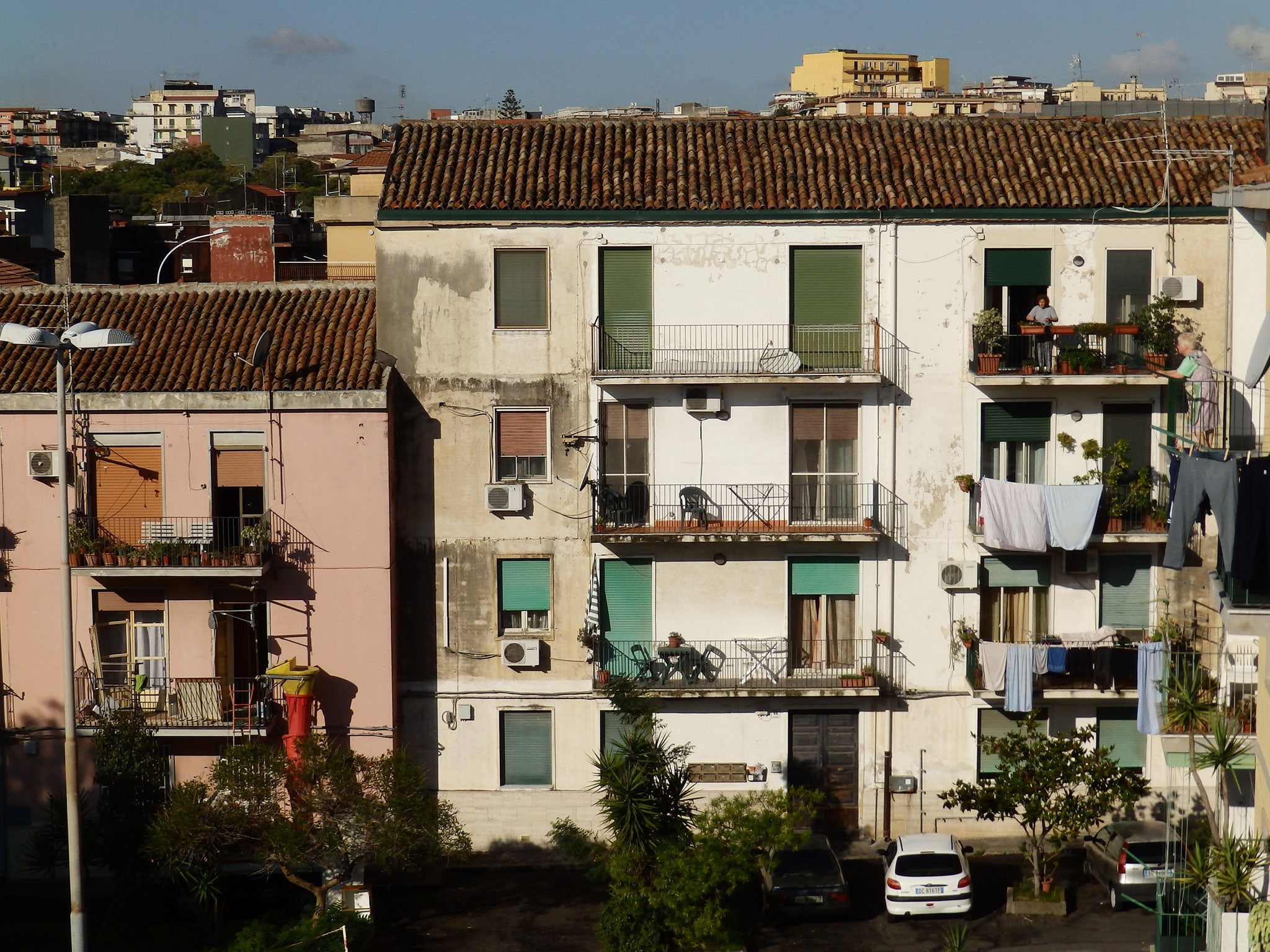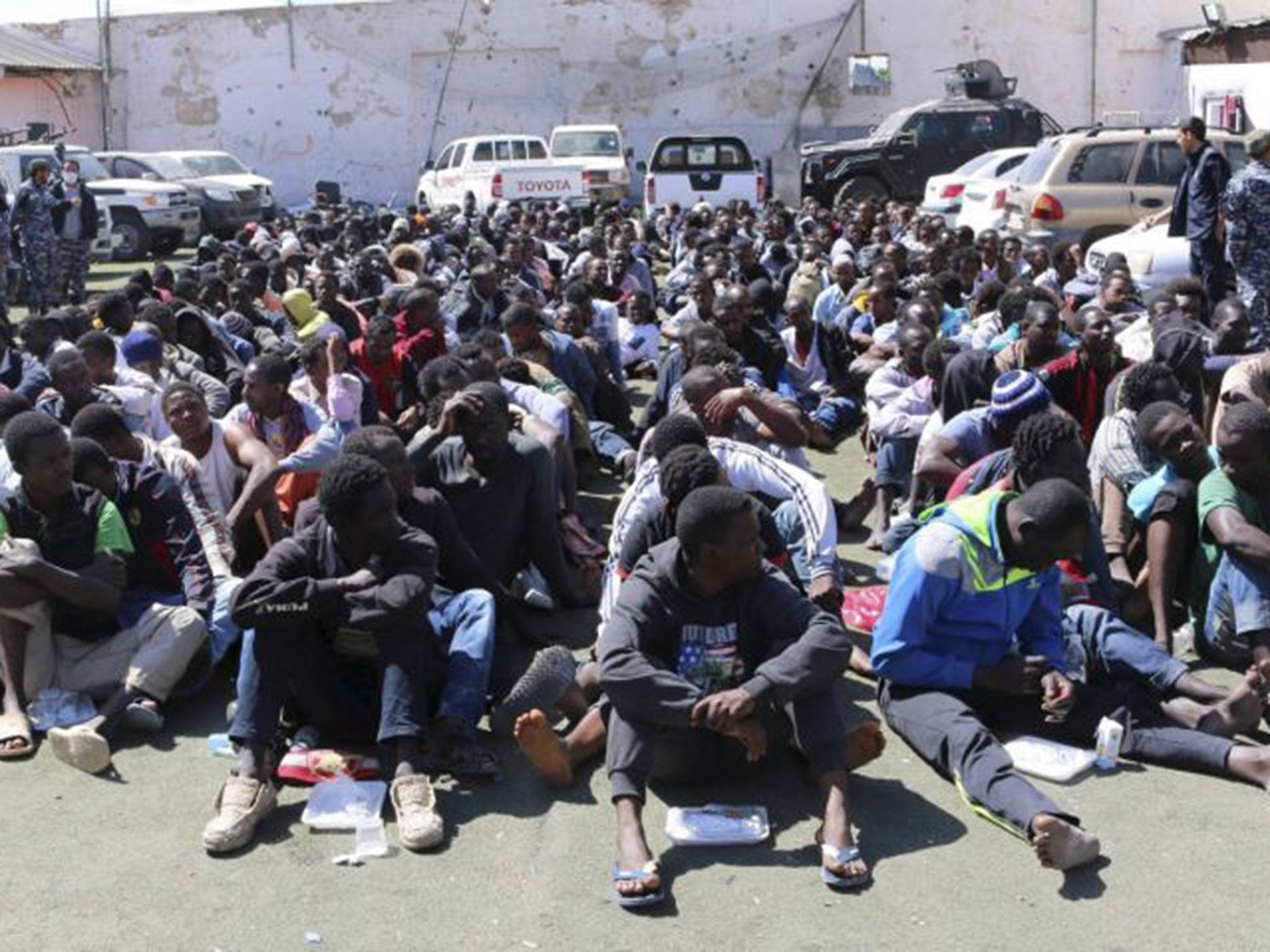Slaves on our Streets: Migrants taking deadly boat crossings to Europe after fleeing forced labour in Libya
'Every time I worked for someone they had a gun. If you complain they don’t pay you, they will shoot you'

“Sometimes they would just come and take you, make you do your work and then go. If you asked for money, you were looking for your death.”
Bright, a 29-year-old Nigerian man, laughs bitterly at the thought of challenging the heavily armed Libyan men who forced him to work in the conflict-ridden country for four years.
He is among thousands of migrants to risk deadly boat crossings over the Mediterranean Sea to escape abuse in Libya, which has become one of the world’s major hubs of modern slavery.
The Independent, in partnership with the London Evening Standard, is exposing the human trade in Britain and around the world as part of a special investigation.
The brutal reality in Libya was far from the prosperity Bright hoped for when leaving his home in 2013, after being told widespread destruction from the brutal Libyan civil war had generated a thriving market for construction workers.
Having paid 150,000 Naira (£317) to undertake the treacherous journey through the Sahara on a pick-up truck, he was taken to the town of Murzuk – one of the hubs of Libya’s modern slave trade.
“The day we arrived there was still war in [the nearby city of] Sabha,” he told The Independent. “I could hear the fighting but I didn’t have the money go back.”

A trained plumber, Bright would queue up daily alongside other sub-Saharan migrants in the town in the hope of finding menial work, but soon found local Libyans unwilling to pay.
“Maybe they need deck layer or painter, any type of work they would come there,” he recalled.
“They [Libyan men] are with guns always. So you won’t have the strength to ask for money. Even if they don’t show you that they have a gun, you know there is a gun in that car. Every citizen has a gun in Libya.”
Trapped without enough money to move on, or return home to Nigeria, Bright laboured in Murzuk for four years until the treatment got even worse and he feared being kidnapped.
The International Organisation for Migration (IOM) has confirmed the existence of open-air “slave markets” in the region, where sub-Saharan African migrants are bought and sold by traders extorting them for labour, prostitution or ransom.
“I didn’t have the money to go back to Nigeria, it was cheaper to get a boat,” Bright said, describing how he fled to Tripoli and paid a smuggler 1,200 dinar (£660) to attempt the crossing to Europe.
“They put us in this big warehouse – it was like hell. No food, no water, everything had to be paid for.
“If people have no money it is not their business. They never let us outside. They always have guns.”
Bright lost track of time in the makeshift prison but thinks he was detained for around a month, where he saw several migrants die of illness and starvation, and others killed by Libyan guards.

“They shot many people,” he said. “Maybe two people would be fighting and they would come and shoot the person they thought was guilty. Just like that.”
Bright was eventually put on a rubber boat, which broke down in the Mediterranean and was rescued, seeing him arrive in Italy on 8 August.
He was taken to Sicily, where The Independent met him at a rehabilitation centre run by Médecins Sans Frontières (MSF) for migrants with medical and psychological needs.
Another patient, 22-year-old William, was also drawn to Libya after hearing tales of opportunity arising from the ashes of the bloody civil war, but was kidnapped and enslaved for almost two years.
“There was an Arab man, he took me to this place,” he said, describing a squalid compound filled with hundreds of other migrants.
“We were working every day, they would come and take me to different places.”
He and his fellow prisoners were forced to carry out hard labour on construction sites, being rewarded with barely enough food and drink to survive.
William said his “body was giving up” under the strain but that to refuse the work meant certain death.
“Every time I worked for someone they had a gun,” he added. “Maybe if you complain they don’t pay you, they will shoot you. I knew they would shoot me or they would beat me.”
On rare occasions, William was given a little money to buy food and stockpiled his meagre funds until he was able to bribe a Libyan man where he was taken to work to let him escape.
With no way of getting back to Nigeria, he followed hundreds of thousands of asylum seekers and migrants attempting to flee Libya over the Central Mediterranean – now the deadliest sea crossing in the world.
He and Bright’s stories are far from unique at the rehabilitation centre in Catania, whose current inhabitants include victims raped, imprisoned, trafficked and tortured in Libya.
The men are being treated for serious illnesses most likely contracted during their journeys but are starting to recover, with The Independent finding them playing a gentle game of football in the Sicilian sunshine.
They both hope to gain the right to remain, learn Italian and work after completing their rehabilitation at MSF’s centre in Catania.
Among the other patients is a 35-year-old mother from Cameroon who was kidnapped and detained for two months in Libya earlier this year.
She said women in the camp were taken away every day to be raped, possibly to earn money for their captors, while the men were forced into labour.

“Every day the Arabs came and took the men somewhere to work. They held guns to their heads,” she added.
“When you arrive in Libya, all hope is lost. You don’t know if they’re going to kill you or send you back, or let you leave.”
MSF staff said all of the patients treated so far at its rehabilitation centre in Catania had passed through Libya, being referred from hospitals with physical injuries or serious illness after being rescued at sea.
Dr Erika Spagnolo, the resident psychologist, said they suffered “traumatic experiences – not just in their countries of origin but during transit and the sea crossing”.
She said detention was a “constant element” of migrants’ horrific experiences in Libya, adding: “In all of these detention centres – both informal and official – they all suffer violence and abuse and all women report rape and sexual abuse.
“As well as the physical experience, the psychological experience is very traumatic. A lot of people are forced to witness violence against other people – beatings and torture.”
Many migrants arriving in Italy have been forced to work for months or years in Libya before being able to flee over the Mediterranean, Dr Spagnolo said, adding: “Even if you have money to pay a ransom, it doesn’t always save you because a lot of times the people who take you first keep the money and sell you to another militia and the vicious cycle starts again.”
Six of the nine patients at MSF’s centre in Catania have suffered physical abuse including rape, beatings and torture.
Chronic post-traumatic stress disorder (PTSD), insomnia and flash-backs are common, with the trauma sometimes triggering hormonal alterations and other physical symptoms.

Recent research in southern Italy found that 89 per cent of migrants arriving by boat have psychological issues linked to their experiences in Libya, with almost three-quarters of those expected to suffer a long-term impact.
The United Nations has identified Libya country as a hub of modern slavery, where armed gangs operate with impunity and corruption is rife among the fractured authorities charged with reimposing the rule of law.
A report on humanitarian needs concluded that migrants in Libya made “easy targets” for human trafficking networks that financially exploit or abuse them, using forced labour, prostitution and ransom to generate huge profits frequently funnelled back into conflict and terrorism.
Recent research by the IOM showed that almost half of migrants arriving in southern Italy had been made to work without pay, including in domestic work, construction, manufacturing and agriculture, with 90 per cent of forced labour taking place in Libya.
Yitna Getachew, of the agency’s North Africa office, said Bright and William’s cases “were not isolated”.
“We estimate that there between 700,000 and one million migrants in Libya, with between 5,000 and 6,000 in detention,” he added.
“These practices are mainly happening while the migrants are in the custody of smugglers and armed groups [where] it’s very difficult to provide interventions.”
The British Government said it was doubling development spending to tackle modern slavery while pushing for a “diplomatic solution” to the Libyan war, which shows little sign of slowing six years after the UK helped oust dictator Muammar Gaddafi.
A spokesperson at the Department for International Development said: “We have provided lifesaving food, water and shelter to the most vulnerable people in Libya and we are protecting girls and women from trafficking, forced labour and sexual violence, helping to stop vicious cycles of abuse for thousands.
“The UK calls upon the international community to translate tough words into tough action – we will not accept a world where human beings are bought and sold.”
Join our commenting forum
Join thought-provoking conversations, follow other Independent readers and see their replies
Comments
Bookmark popover
Removed from bookmarks